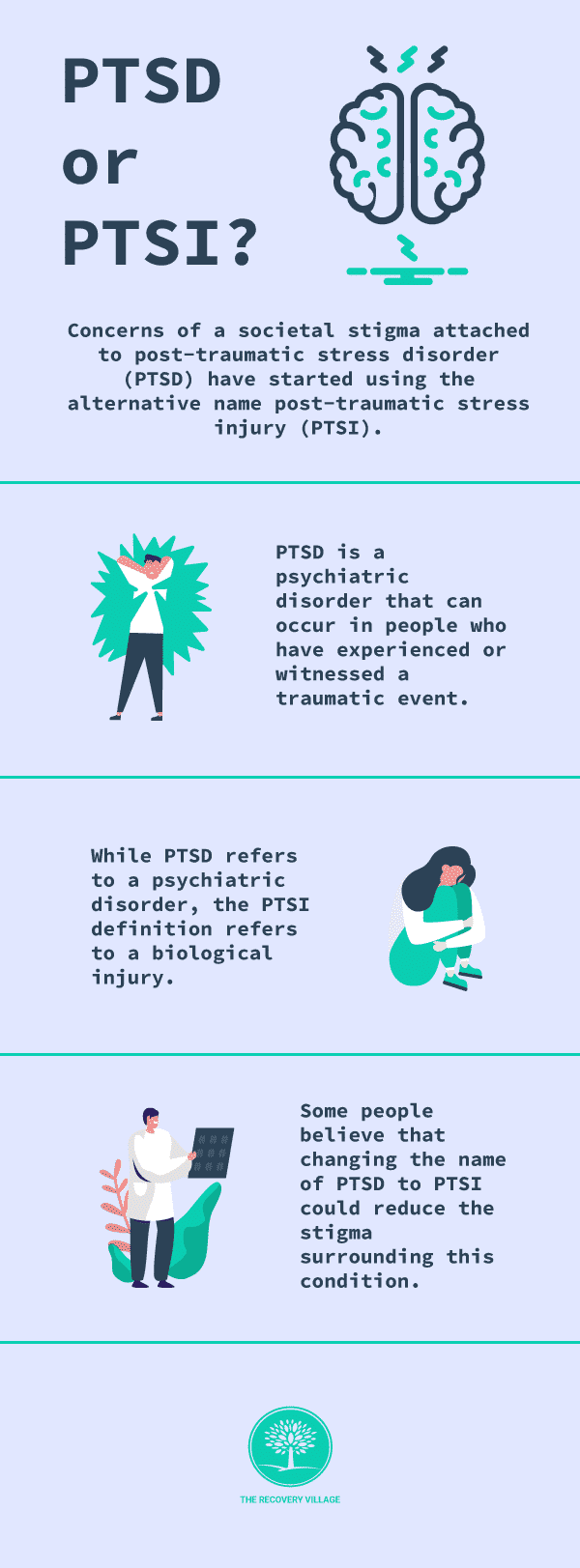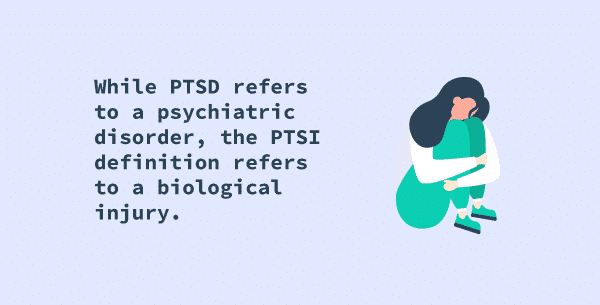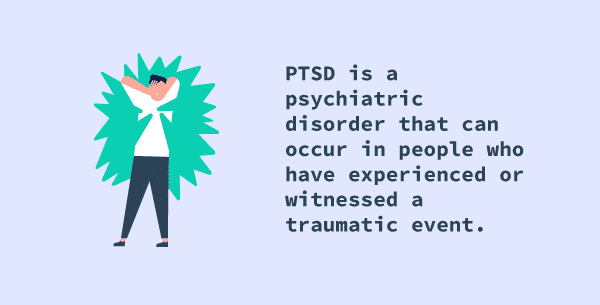Some people believe that changing the name of post traumatic stress disorder (PTSD) to post traumatic stress injury (PTSI) could reduce the stigma surrounding this condition.
Concerns of a societal stigma attached topost-traumatic stress disorder(PTSD), and mental health conditions in general, is not a new phenomenon. However, what is new is the approach to reduce this stigma.
Fearing that people with PTSD may avoid seeking help because of stigma, a change in the disorder’s name and understanding have been proposed. The alternative name post-traumatic stress injury (PTSI) has gained popularity and, despite not yet being an accepted medical diagnosis, many people have begun using this term.
To understand both sides of thePTSD vs. PTSIdebate, thedifferences between PTSD and PTSImust be explored.

Article at a Glance:
- A change to the name of PTSD has been proposed, mainly out of fear that people — especially veterans — may avoid seeking treatment due to stigma
- PTSD is a psychiatric disorder which occurs after experiencing or witnessing a traumatic event
- The proposed name, PTSI, hopes to change the perception of this condition from a psychiatric disorder to a biological trauma that affects the nervous system
- People who want the name changed believe the word disorder discourages veterans from seeking treatment
- People who want the name to remain the same believe this change would not do anything to change the stigma and that the condition needs to be approached differently, especially by the military
What Is PTSI?
TheAmerican Psychiatric Associationdefines PTSD as “A psychiatric disorder that can occur in people who have experienced or witnessed a traumatic event.”
Treatment Can Be Life Changing. Reach out today.
Whether you are struggling with addiction, mental health or both, our expert team is here to guide you every step of the way. Don’t wait— reach out today to take the first step toward taking control of your life.
With this definition in mind,what is PTSI? In essence,PTSIrefers to the same set of symptoms. The main difference is the conceptualization of what has caused these symptoms. While PTSD refers to a psychiatric disorder, thePTSI definitionprovided by theGlobal PTSI Foundationrefers to a biological injury.
This organizationhas stated that PTSI is a biological trauma citing the physical changes which occur in the nervous system in people with this condition. While mental health experts have long acknowledged and understood the physical changes associated with PTSD, some argue that changing the name would change peoples’ perception of the condition.

Who Is Affected by PTSD?
While research is not yet available based on the proposed term PTSI, research into PTSD and PTSD statistics can begin to give an understanding of whose diagnoses may be affected by this name change.
PTSD in the General American Population
- Approximately60% of men and 50% of womenexperience a traumatic event at some point in their lives
- In the United States,7-8% of the total populationwill develop PTSD at some point in their lives
- Approximately8 million peopledevelop PTSD in a given year
- Interestingly, PTSD is more common in women, with10% of womendeveloping the disorder compared to4% of men. This fact may also be due to the higher probability of a woman to experience a traumatic event.
PTSD in Children and Teens
Among young people,PTSD in childrenand teens may occur following a trauma, just as it would develop in an adult.
- Approximately15% of girls and 14% of boysexperience at least one traumatic event during childhood
- From this group of children who experience trauma,3% to 15% of girls and 1% to 6% of boyswill develop PTSD
Causes of Post-Traumatic Stress
Frequently, PTSD is most commonly associated withveterans returning from war, but there are many otherPTSD causes. For example,PTSDcaused bysexual abuseor assault andPTSDcaused bydomestic violenceare both commonly occurring traumatic events.
Other examples of traumatic events which may lead to PTSD include:
- Assault
- Car accidents
- Natural disasters
- Exposure to acts of terrorism
- Incarceration
This condition is not limited to people who experience trauma first-hand. Those who witness an event like these may develop PTSD as well. In some cases,close friends and family membersof a person who has experienced a traumatic event will develop PTSD.
Are you or a loved one dealing with a life-altering trauma and are struggling to cope? ContactMental Health Americaat 1-800-273-TALK (8255) to find help today.

PTSI in the Military
The high rate ofPTSD in veteranssparked the initial research into this condition. Once referred to as “shell shock,”PTSDwas observed inwar veteransupon return home. While once considered a sign of weakness, the understanding ofPTSDin themilitaryhas grown tremendously.
The Department of Veteran’s Affairsrecognizes the challenges that veterans face who develop PTSD. Calls to change the name of this condition have sprung largely from veterans who make up a large portion of the total affected individuals. People in favor of the name change believe that having the word disorder in the name of this condition may prevent people — especially veterans — from seeking help, due to societal stigma surrounding mental health conditions.
Renaming PTSD as PTSI: Possible Impact
Both positive and negative potential impacts of changing the name of PTSD toPTSIhave been noted. The main argument for the name change has focused around allegedPTSD stigma.
While the former Army Vice Chief of Staff,Peter Chiarelli, statesthat he feels the word “disorder” is what inhibits veterans from seeking treatment, others have argued that changing the name without making any other modifications would not do anything to change the stigma.Dr. Matthew Friedman, Senior Advisor atthe National Center for PTSD, has challenged Chiarelli, citing how the military handles traumatized soldiers as the greatest contributor to PTSD stigma.

Concerns About PTSD and the Purple Heart
One controversy surrounding the military’s approach has to do withPTSD andthePurple Heart, which is a U.S. military decoration awarded to people who are wounded or killed in the line of duty.
At this time, veterans diagnosed with PTSD are not eligible to obtain the Purple Heart. Some people believe that changing the name would allow veterans affected by this condition to receive the Purple Heart while others suggest the rule should be changed, not the condition’s name.
Canada’s Approach to PTSD
In Canada, the military approach to PTSD is to reduce the stigma around the condition. The Canadian military uses the term Operational Stress Injury to refer to a range of effects of the psychological trauma of warfare, including PTSD. Individuals with this diagnosis can receive the Canadian equivalent to the Purple Heart.
People who are opposed to changing the condition’s name state that Canada’s approach gives the best of both worlds: working to reduce stigma for military veterans without changing the diagnosis. The people who argue that the name should remain the same believe that changing the name would create undue confusion.








